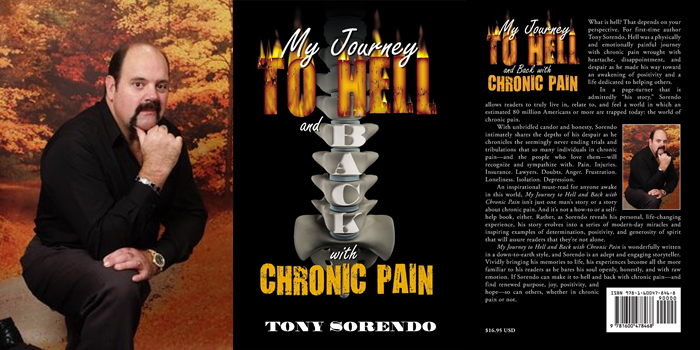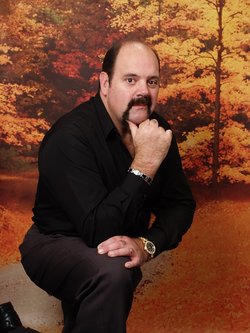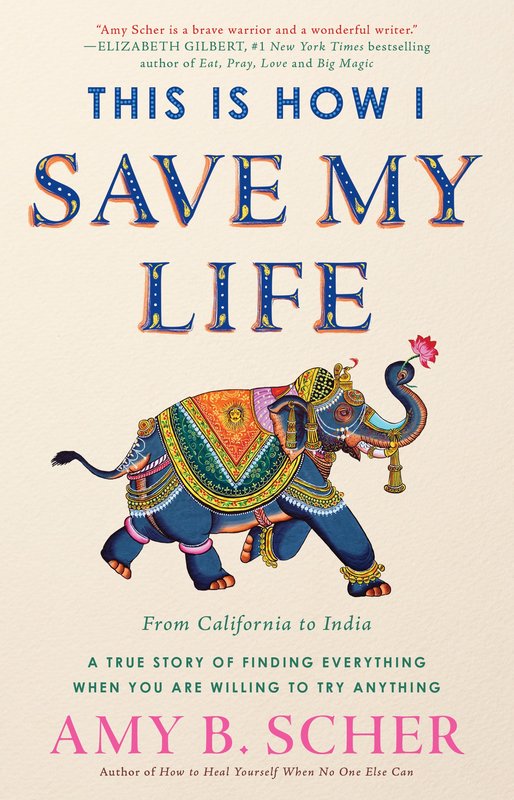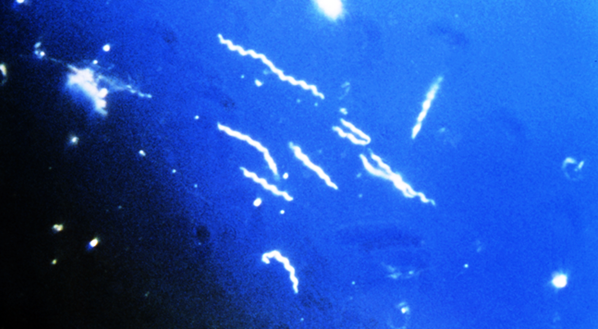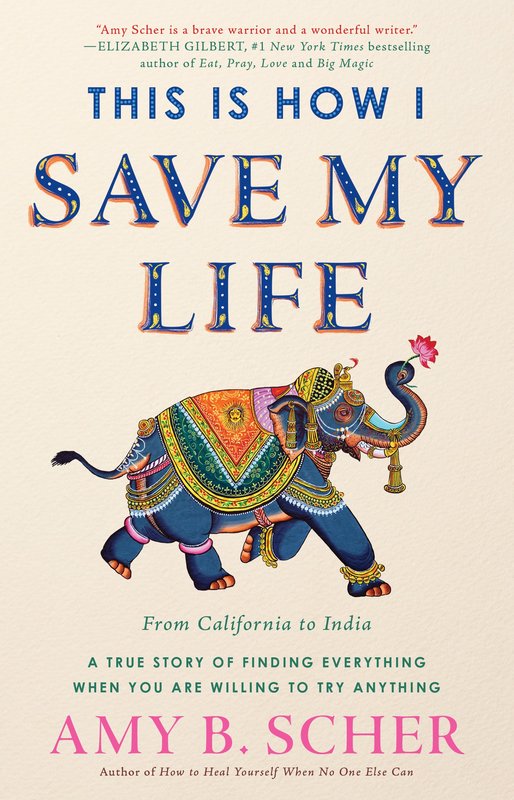Interview: Tony Sorendo, Author Of "To Hell And Back With Chronic Pain"
October 11, 2014 in Interviews by Public Health Alert, with Tony Sorendo
I recently had the pleasure of reading “My Journey to Hell and Back with Chronic Pain” by author Tony Sorendo. The book is an account of his personal version of hell, which took place amid the presence of intense chronic pain. Although, as many of you may know all too well, mass heartbreak, defeat, and darkness inevitably surrounds any journey which chronic pain accompanies one on, Sorendo managed to come out on the other side of the ordeal as a more enlightened being, as opposed to becoming hardened by the pain he endured. His book serves as a reminder that pain does not have to defeat us; rather it can help us grow in ways we never imagined. He has kindly taken the time to answer a few questions for Public Health Alert.
PHA: I think many of us who suffer from chronic pain are subconsciously guilty of doing what you talk about on page 179. We get so absorbed in our pain that it is all we talk about, and we easily become offended if those around us do not seem overly enthusiastic about what we are telling them and immediately think they do not care that we are in pain and, in short, do not care about us. You made a greatpoint when you said, “Often, it’s not that people who can’t relate are necessarily insensitive to your situation, it’s more that negativity can bring them down in the process.” Care to elaborate?
Tony: Often times in our society we judge by what we see, not by what we can't see. Chronic pain is no different. This is why chronic pain is often referred to as “INVISIBLE PAIN “. If one can't see it doesn't exist. That being said, on the flip side of the coin, people who have never experienced what it is like to live every day in chronic pain have no clue of what that world is like. Not only have they never experienced the physical aspect of pain, but the emotional toll that it takes on one as well. I have had the opportunity to work with people who suffer in pain. Often I come across someone who will eat, sleep, and drink pain. That is all they talk about. They have made pain become their identity in
life. I like to refer to it as 'Addicted to their story”. For those who do not know that world, it can be very wearing on a person to hear that day after day and can, unfortunately cause a negative vibe with the person who is in pain. I know this because I was once this very person. I lost people that I thought were friends over my pain because they couldn't understand. As hard as it is at times, don’t make the mistake of letting pain define who you are as a person.
PHA: You talk about your relationship with your wife, Pam, throughout the book. Maintaining healthy romantic relationships while enduring chronic pain is a hot topic among many who are ill, and for good reason –it is downright challenging. What is the best advice you have to offer for those who are struggling but striving to keep the romance in their relationships alive while chronic pain simultaneously gnaws at every inch of their body?
Tony: I, by no means, am an expert on this matter. I do know, however what an affect that pain has had, and still does in my own situation. I have seen many marriages and relationships end because of pain. We all know how relationships can sometimes be challenging enough without the added stresses of “outside” elements. Add chronic pain to that equation and it can become a whole different ball game. Someone will
most likely feel deprived and the other, guilt ridden. It can become a very viscous cycle and destroy good relationships. I know that the words “For better or for worse” are a part of the vows but most of us never sigh up for “Worse” and that can definitely be challenging. My best advice to anyone who is in this situation, first and foremost, you need strong communication skills in your relationship. I am also a huge advocate on
counseling. In my opinion, professional help can have a big impact on this type of situation.
PHA: How about other relationships such as those with friends, family members, or coworkers?
Tony: As far as friends, family, and co-workers go ,I believe that you have to maintain a certain balance when it come to your pain . Friends and coworkers often can't relate, as I stated before. I try to keep an uplifting attitude when around them as hard as it might be at times. Family can often sympathize with you but there is nothing they can do to help you and that can become frustrating for them as well. Keeping a positive attitude goes a long way, not only for the way that they perceive you, but you are also helping yourself as well.
PHA: In the beginning of your book, you take us through the journey of having your childhood dream of playing professional baseball stripped from you due to chronic pain. So many who face a chronic illness, or chronic pain stemming from any other source, are faced with feelings of defeat from having the possibility of doing the things they once dreamed of doing taken away. This can turn the very idea of daring to dream again into an absolutely terrifying one. What have you found to be the best way to push past the feeling of defeat, pull yourself together, and essentially learn to once again dream without fear?
Tony: Having my professional Baseball career end in the way that it did was truly devastating, to say the least. My dreams were shattered in the blink of an eye. Spending years of blood, sweat, and tears, hard work and determination; it was gone in an instant. It took me many years to get over that broken dream. After many years of surgeries, heartbreak, broken dreams, and close to death several times, my attitude has changed. I now longer dwell on the past-what could have, would have happened. I no longer focus on the things that I am no longer able to do but rather but embrace and give thanks to the things that I am still able to do. It is called “GRATITUDE”. When you focus on new goals and take action toward those goals, your past letdowns only become stepping stones to where you need to be in life. I never in a million years would
have ever thought of someday writing a book and have it published, let alone being able to give back to others. When one goal never comes to surface, focus on a new goal, live it, dream it, take action to archive it. Don't ever let your pain take that away -ever!
PHA: In chapter fourteen you talk about the first time you played guitar again, and for three hours at that, after open heart surgery. You said, “as crazy as it sounds, something deep inside of me just took over my heart and soul and touched every fiber of my body ...It was as if I’d forgotten I’d ever gotten open heart surgery, and that wiped-out feeling that plagued me for so long became non-existent. “ That moment seemed to serve as a doorway for your soul, allowing you to feel “magic” in your life again. Afterwards, your health and overall wellbeing began
to improve. Do you attribute the magical feeling of having the creativity of your soul flow through you and come to life to the improvements in your health that followed?
Tony: I most definitely attribute that “Magical Moment” the turning point of my recovery from major open heart surgery. That operation had definitely taken its toll on me, physically, mentally, and emotionally-for sure. Other than being told that I may never walk again after my 14th surgery that was by far the hardest thing that I have ever been through-hands down!!! Weeks and weeks went by feeling like I had been hit by a huge truck and feeling that there was no end in sight, were very wearing on me. From the first time that I had picked up that guitar and started playing with the people that I have shared the love of music with, that’s where the “MAGIC” became real for me. Something deep inside had emerged and I had embraced it and never let go. I believe it was the first day of the rest of my life, truly. I believe that we all have that magical creativity in all of us. We must never let our pain get in the way. Always keep the faith.
PHA: I think many of us who suffer from chronic pain are subconsciously guilty of doing what you talk about on page 179. We get so absorbed in our pain that it is all we talk about, and we easily become offended if those around us do not seem overly enthusiastic about what we are telling them and immediately think they do not care that we are in pain and, in short, do not care about us. You made a greatpoint when you said, “Often, it’s not that people who can’t relate are necessarily insensitive to your situation, it’s more that negativity can bring them down in the process.” Care to elaborate?
Tony: Often times in our society we judge by what we see, not by what we can't see. Chronic pain is no different. This is why chronic pain is often referred to as “INVISIBLE PAIN “. If one can't see it doesn't exist. That being said, on the flip side of the coin, people who have never experienced what it is like to live every day in chronic pain have no clue of what that world is like. Not only have they never experienced the physical aspect of pain, but the emotional toll that it takes on one as well. I have had the opportunity to work with people who suffer in pain. Often I come across someone who will eat, sleep, and drink pain. That is all they talk about. They have made pain become their identity in
life. I like to refer to it as 'Addicted to their story”. For those who do not know that world, it can be very wearing on a person to hear that day after day and can, unfortunately cause a negative vibe with the person who is in pain. I know this because I was once this very person. I lost people that I thought were friends over my pain because they couldn't understand. As hard as it is at times, don’t make the mistake of letting pain define who you are as a person.
PHA: You talk about your relationship with your wife, Pam, throughout the book. Maintaining healthy romantic relationships while enduring chronic pain is a hot topic among many who are ill, and for good reason –it is downright challenging. What is the best advice you have to offer for those who are struggling but striving to keep the romance in their relationships alive while chronic pain simultaneously gnaws at every inch of their body?
Tony: I, by no means, am an expert on this matter. I do know, however what an affect that pain has had, and still does in my own situation. I have seen many marriages and relationships end because of pain. We all know how relationships can sometimes be challenging enough without the added stresses of “outside” elements. Add chronic pain to that equation and it can become a whole different ball game. Someone will
most likely feel deprived and the other, guilt ridden. It can become a very viscous cycle and destroy good relationships. I know that the words “For better or for worse” are a part of the vows but most of us never sigh up for “Worse” and that can definitely be challenging. My best advice to anyone who is in this situation, first and foremost, you need strong communication skills in your relationship. I am also a huge advocate on
counseling. In my opinion, professional help can have a big impact on this type of situation.
PHA: How about other relationships such as those with friends, family members, or coworkers?
Tony: As far as friends, family, and co-workers go ,I believe that you have to maintain a certain balance when it come to your pain . Friends and coworkers often can't relate, as I stated before. I try to keep an uplifting attitude when around them as hard as it might be at times. Family can often sympathize with you but there is nothing they can do to help you and that can become frustrating for them as well. Keeping a positive attitude goes a long way, not only for the way that they perceive you, but you are also helping yourself as well.
PHA: In the beginning of your book, you take us through the journey of having your childhood dream of playing professional baseball stripped from you due to chronic pain. So many who face a chronic illness, or chronic pain stemming from any other source, are faced with feelings of defeat from having the possibility of doing the things they once dreamed of doing taken away. This can turn the very idea of daring to dream again into an absolutely terrifying one. What have you found to be the best way to push past the feeling of defeat, pull yourself together, and essentially learn to once again dream without fear?
Tony: Having my professional Baseball career end in the way that it did was truly devastating, to say the least. My dreams were shattered in the blink of an eye. Spending years of blood, sweat, and tears, hard work and determination; it was gone in an instant. It took me many years to get over that broken dream. After many years of surgeries, heartbreak, broken dreams, and close to death several times, my attitude has changed. I now longer dwell on the past-what could have, would have happened. I no longer focus on the things that I am no longer able to do but rather but embrace and give thanks to the things that I am still able to do. It is called “GRATITUDE”. When you focus on new goals and take action toward those goals, your past letdowns only become stepping stones to where you need to be in life. I never in a million years would
have ever thought of someday writing a book and have it published, let alone being able to give back to others. When one goal never comes to surface, focus on a new goal, live it, dream it, take action to archive it. Don't ever let your pain take that away -ever!
PHA: In chapter fourteen you talk about the first time you played guitar again, and for three hours at that, after open heart surgery. You said, “as crazy as it sounds, something deep inside of me just took over my heart and soul and touched every fiber of my body ...It was as if I’d forgotten I’d ever gotten open heart surgery, and that wiped-out feeling that plagued me for so long became non-existent. “ That moment seemed to serve as a doorway for your soul, allowing you to feel “magic” in your life again. Afterwards, your health and overall wellbeing began
to improve. Do you attribute the magical feeling of having the creativity of your soul flow through you and come to life to the improvements in your health that followed?
Tony: I most definitely attribute that “Magical Moment” the turning point of my recovery from major open heart surgery. That operation had definitely taken its toll on me, physically, mentally, and emotionally-for sure. Other than being told that I may never walk again after my 14th surgery that was by far the hardest thing that I have ever been through-hands down!!! Weeks and weeks went by feeling like I had been hit by a huge truck and feeling that there was no end in sight, were very wearing on me. From the first time that I had picked up that guitar and started playing with the people that I have shared the love of music with, that’s where the “MAGIC” became real for me. Something deep inside had emerged and I had embraced it and never let go. I believe it was the first day of the rest of my life, truly. I believe that we all have that magical creativity in all of us. We must never let our pain get in the way. Always keep the faith.
About the author
Tony Sorendo is the author of the book "My Journey to Hell and Back with Chronic Pain", and the Facilitator for the American Chronic Pain Association.
latest posts
tags
Disclaimer: The information on this website is not a substitute for professional medical advice.
Always consult with your treating physician before altering any treatment protocol.
Always consult with your treating physician before altering any treatment protocol.
